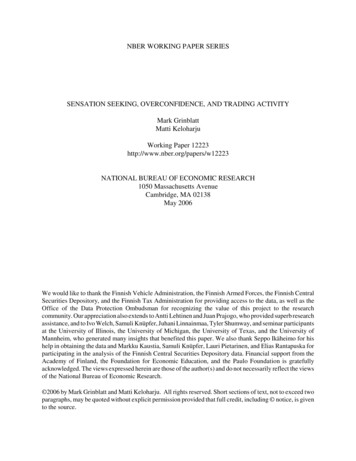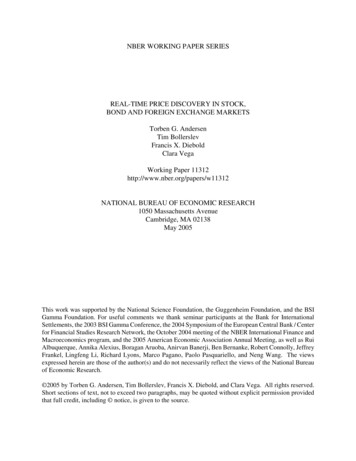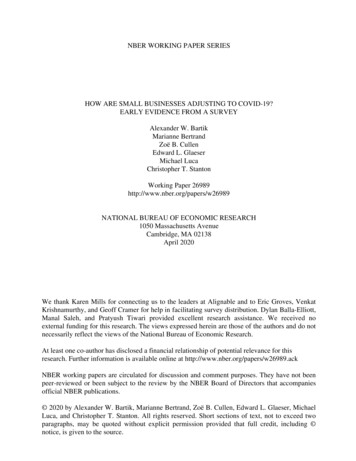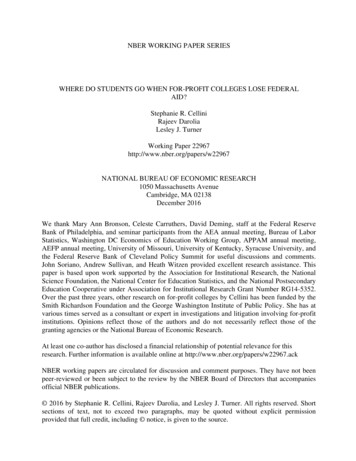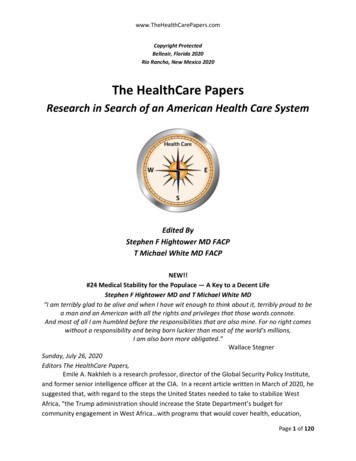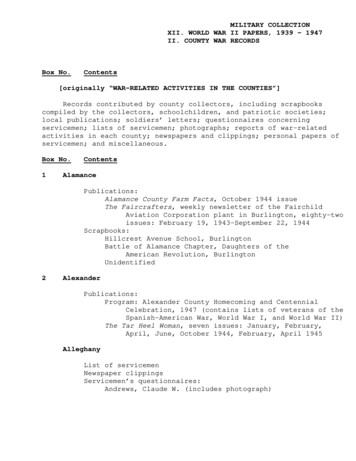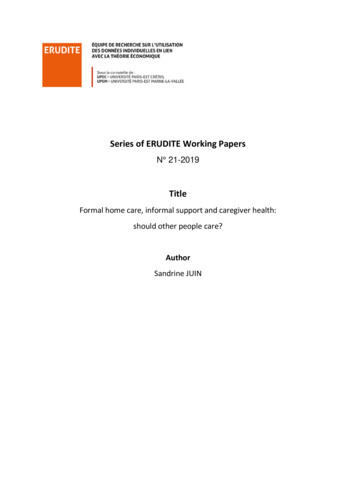
Transcription
Series of ERUDITE Working PapersN 21-2019TitleFormal home care, informal support and caregiver health:should other people care?AuthorSandrine JUIN
FORMALHOME CARE, INFORMAL SUPPORT ANDCAREGIVER HEALTH: SHOULD OTHER PEOPLE CARE?Sandrine JUINUniversity Paris-Est Créteil, ERUDITE, Tepp FR CNRS 3435Associate researcher at the French Institute for Demographic Studies (INED)Contact: sandrine.juin@u-pec.fr ; 33(0)1.45.17.45.59Université Paris-Est Créteil, UFR de Sciences économiques et de Gestion, ERUDITE,61, avenue du Général de Gaulle – Route de ChoisySite du Mail des mèches, Bureau 226, 94010 Créteil, FRANCEAbstractIn the context of an aging population, it is important to study informal caregivers who are themain providers of support for dependent elderly people. This work estimates how socialsupport (i.e. informal support received from the family/social network and formal home care)affects caregivers' general and mental health.To take into account potential endogeneity biases, instrumental variables models areestimated on a sample of 755 non-coresiding caregivers from the French Disability and HealthSurvey (2008-2009). The results show that an increase in formal care hours significantlyreduces the probability that caregiving affects health and that it leads to sleep disorders ordepression. Regarding informal support, an increase in the number of informal caregiverslimits the risk that caregivers feel morally tired and that they have palpitations/tachycardia orsleep disorders. This study highlights the importance of improving access to formal home careservices and of encouraging informal support and solidarity.Keywords: caregivers; informal care; formal home care; mental health; social support;France.JEL: I10; D10; C26.1
1. IntroductionThe number of persons aged 80 and over is projected to increase from 3.7 million to 8 millionin France and from 25.9 million to 61.7 million in Europe by 2060. People aged 80 and overwill represent 12% of the European population in 2060, compared to 6% today (Eurostatprojections). In France, the number of dependent elderly persons is projected to reach 1.5million in 2040 (Marbot and Roy, 2015). In this context of an aging population, it is importantto understand the consequences of informal care (i.e., care provided by the family, friends andneighbors) on caregivers' health. Indeed, informal caregivers are the main providers ofsupport for dependent elderly people and may become even more important in the future,given increasing pressures on the sustainability of long-term care systems. In France,according to the High Family Council, informal caregivers provide more than three quartersof the total hours of care, and half of dependent elderly persons receive only informal care(HCFEA, 2017). Reports from the European Commission and the OECD (Colombo et al.,2011) have acknowledged the importance of supporting caregivers. In France, the Law on theadaptation of society to the aging of the population (Loi d'adaptation de la société auvieillissement), adopted in December 2015, recognizes the right to respite for familycaregivers (through additional hours of formal home care, day-care services, temporaryaccommodation), reinforces counseling and training services and underlines the need toreconcile paid employment and informal care.The economic literature has been more interested in the effect of providing informal care onlabor market participation and wages (for literature reviews on this topic see Bauer andSousa-Poza, 2015 and Lilly et al., 2007) rather than on health. In addition, studies on informalcaregivers' health generally do not assess whether heterogeneous care arrangements lead todifferent health consequences. It is important to investigate the effect of informal care onhealth, not only because it is costly in terms of caregivers’ well-being, but also because healthproblems can lead to many other negative consequences. Indeed, caregivers are characterizedby a higher probability of medication use (Do et al., 2015; Van Houtven et al., 2005), the costof which is borne by informal caregivers and by public expenditures. In addition, it has beenshown that problems of depression among caregivers are associated with missed work(Wilson et al., 2007), which represents an economic cost to caregivers, care employers and tosociety as a whole. Caregivers’ stress and burden may also lead to early institutionalization ofdependent elderly people (Spillman and Long, 2009; Yaffe et al., 2002). In France, it has been2
estimated that 29% of nursing home expenditures are covered by public expenditures, while71% remain the responsibility of care recipients and their families (Charpin Report, 2011).Finally, caregivers’ health problems may decrease the quality of informal care and evenincrease the risk of elder abuse (Schulz and Beach, 1999; Smith et al., 2011). Yuda and Lee(2016) find on Japanese data that a decline in caregivers' physical or mental health adverselyaffects care recipients' health.This paper aims to estimate from French data the effect of social support (i.e. informal supportand formal home care) on the health of non-coresiding informal caregivers. Informal supportis defined as the assistance that the caregivers receive from family and other members of thesocial network (e.g., friends and neighbors). This work provides insights for policymakers onhow to shape public policies aimed at supporting informal caregivers. It also explores to whatextent a subsidy on formal care could protect caregivers' health.The article is organized as follows: Section 2 summarizes the existing literature; Section 3presents the data and methodology used; Section 4 provides some descriptive statistics, theresults of the estimations, specification tests and a subsample analysis. The last sectionconcludes.2. Literature reviewThe health and well-being effects of informal care provision have been first documented inresearch in psychology, public health, epidemiology and medicine. The economic literaturehas addressed this topic in more recent years1. Many empirical papers have compared thehealth status of groups of caregivers and non-caregivers, generally using cross-sectional andnational data (see, e.g., Berglund et al., 2015 for a recent paper on Swedish data) and havebeen combined in meta-analyses (Pinquart and Sörensen, 2003; Vitaliano et al., 2003;Vlachantoni et al., 2013). It should be stressed that, in general, these papers use nonrepresentative samples that over-represent caregivers of elderly with dementia. Other studies,based on longitudinal data, examine transitions of individuals into and out of caregiving(Burton et al., 2003; Hirst, 2005; O’Reilly et al., 2008; Schulz et al., 2003; Seltzer and Li,2000). While cross-sectional analyses do not take into account endogeneity problems in therelationship between informal care and health, longitudinal studies allow investigating morecausal effects. This research indicates that providing informal care has negative effects on1Bauer and Sousa-Poza (2015) provide a careful review of the research on caregiving and health up to 2015.3
both physical health (self-reported health, physical symptoms, antibodies and stresshormones) and mental health (stress, depression, distress and loss of subjective well-being) ofcaregivers. Vlachantoni et al. (2013) point out that the effects of informal care provision onhealth outcomes largely depend on the characteristics of caregivers and care receivers and onthe nature of the care provided. The literature has mainly focused on high-income countries,but the results seem to be confirmed in low and middle-income countries (see Lambert et al.,2017 for a study based on data from Ghana, India and Russia).More recently, papers have sought to address the endogeneity of informal care usinginstrumental variables methods (Coe and Van Houtven, 2009; Do et al., 2015), fixed effectsmodels that control for time-invariant unobserved heterogeneity (Kaschowitz and Brandt,2017; Oshio, 2014; Van den Berg et al., 2014) or propensity score matching (Di Novi et al.,2015; Schmitz and Westphal, 2015). Other studies have not explicitly taken into account theendogeneity problem but have underlined the importance of controlling for the healthcharacteristics of dependent elderly persons (Bobinac et al., 2011, 2010; Byrne et al., 2009).Estimates confirm that informal care has negative consequences on health and well-being.Informal care significantly decreases the health-related quality of life (Bobinac et al., 2011); itincreases the probability of having pain that affects daily activities and of reporting fair orpoor health (Do et al., 2015); and it leads to heart conditions for single caregiver men whoprovide continued caregiving (Coe and Van Houtven, 2009). With regard to mental health,informal care has negative effects on happiness (Bobinac et al., 2010) and life satisfaction(Van den Berg et al., 2014), and it is positively associated with burden (Byrne et al., 2009)and psychological distress (Oshio, 2014). Caregiving also increases the depression index ofmarried caregivers who provide continued caregiving (Coe and Van Houtven, 2009) and ofcoresiding caregivers (Kaschowitz and Brandt, 2017). Schmitz and Westphal (2015) stressthat these negative effects on mental health fade out over time.While the health consequences of providing informal care are now well established in theeconomic literature, less is known concerning the mediating effect of social support oncaregivers' health. Theoretically, according to the health capital model (Grossman, 1972),caregivers may invest in formal home care services in order to reduce the caregiving burdenand protect their health. In the stress process model, which was developed within thepsychology and the sociology of mental health (Lawton et al., 1991; Pearlin et al., 1990),caregivers' health and well-being is the consequence of a dynamic process which depends on4
the socioeconomic characteristics of the caregivers, the stressors to which they are exposedand social support. Social support may mitigate the intensity of caregiving primary andsecondary stressors and their impact on health. Primary stressors stem directly from theobjective caregiving demand (e.g., cognitive status of the dependent elderly, number ofactivity restrictions) and the intensity of care provided. They may lead to more subjectivesecondary stressors such as strains in roles and activities outside caregiving (e.g., familyconflict, job-caregiving conflict) and intra-psychic strains (e.g., loss of self-esteem, rolecaptivity).Many empirical studies in nursing and social work, psychology, public health, epidemiologyand medicine have assessed the effects of informal support and formal care on caregiver'shealth. They highlight that the use of formal care (home care, day-care centers and respitecare) has no effect on caregivers' physical health (measured by self-reported health and thefunctional status) or on mental health (measured by burden, depression, stress, anxiety,distress, burnout and general well-being). By contrast, informal support received from thefamily and social network protects caregivers’ mental health but it seems to have no effect onself-reported health (see, e.g., Ducharme et al., 2007; Lee et al., 2007; Moon and DilworthAnderson, 2015; Pinquart and Sörensen, 2007; Raina et al., 2004). Comparative studies basedon European data bring out some interesting results for formal support. Colvez et al., (2002)focus on caregivers of patients with dementia in five types of specific care programs. Theyfind that, compared with caregivers of patients in respite hospitalization program, caregiversof patients in group-living structures or receiving home social services experienced lowerburden. They also stress that day-care centers help to reduce the feeling of social isolationamong caregivers and that expert centers offering medical services decrease the risk ofdepression and work burden. Calvó-Perxas et al. (2018) assess the association between thepolicies of support to caregivers available in several European countries and the health ofcaregivers. They find that non-financial support measures such as respite care, counseling andtraining have a larger protective effect on caregivers' health than financial measures such ascare allowances. However, there are two important limitations to the studies mentioned in thisparagraph. First, they generally use non-representative samples of caregivers of people withdementia or of caregivers living in particular geographical areas. Second, they are based oncorrelation analyses or standard linear regressions that do not take into account the potentialsimultaneity bias between caregivers' health and social support. Interestingly, White-Means5
(1997) accounts for the endogeneity of formal home care decisions and, unlike most studies,finds that formal care protects caregivers' health.This work contributes in several ways to the existing literature. First, it estimates the effect ofsocial support (i.e. informal support received from the family/social network and formal homecare) on the health of non-coresiding caregivers, while also taking into account endogeneitybiases with an instrumental variables approach. Second, it uses data that provide valuableinformation on the characteristics of both the caregivers and the dependent elderly persons.Finally, it provides insights on the health effects of informal care in France.3. Method3.1. Data and sampleIn order to study the relationship between social support and caregivers’ health, I use theHouseholds section and the Caregivers section of the French Disability and Health Survey(Enquête Handicap Santé). This cross-sectional survey, carried out in 2008-2009 by theFrench Institute of Statistics and the Ministry of Health, provides valuable information onboth non-institutionalized dependent people (in the Households section of the survey) andtheir caregivers (in the Caregivers section).4151 dependent elderly persons aged 65 and over and living in the community were selectedfrom the Households section based on activity restrictions (difficulties in performing alone atleast one essential activity of daily living ADL or one instrumental activity of daily livingIADL). Among these dependent persons, 3440 received informal care and they listed a totalnumber of 3542 non-coresiding informal caregivers and 2047 coresiding caregivers, providingaid with daily life tasks, financial/material aid or moral support. However, the instrumentsused in the following analysis were not strong enough for coresiding caregivers, and theendogeneity problem could not be addressed. Consequently, the remainder of the paperfocuses on non-coresiding caregivers. Some of the 3542 non-coresiding caregivers did not fallwithin the scope of the Caregivers section, could not be contacted or did not respond to thesurvey, which leaves us with 1107 non-coresiding caregivers2. Finally, I removed the fewcaregivers who provided only financial or material assistance, who are at lower risk of healthproblems, and the caregivers who helped several persons. Indeed, information was available2Beliard et al. (2012) have conducted a qualitative analysis on the role of the interviewer on the number of informalcaregivers reported by dependent elderly persons in the Households survey and on the number of respondents to theCaregivers section of the French Disability and Health Survey.6
on only one care relationship, and I wanted to exclude health variations associated withmultiple caregiving roles. The final sample contains 755 non-coresiding caregivers afterdeleting missing values (see Figure A1 in Appendix A for a more detailed description of thesample selection).Table A1 in Appendix A compares this sample (column 1) with other non-coresidingcaregivers excluded from the study (2) and coresiding caregivers (3), based on informationprovided by the dependent elderly persons in the Households survey. The comparison ofsamples (1) and (2) of non-coresiding caregivers shows that the caregivers used in thefollowing analysis over-represent caregiving daughters (37% vs. 30%) and under-representcaregivers of elderly living in couples (21% vs. 36%). In addition, the studied sample seemsto be characterized by caregivers providing care to dependent elderly in poorer health (andreceiving slightly more hours of formal care) than in the excluded sample. Coresidingcaregivers in column (3) are older than non-coresiding ones: 51% are aged 70 and older ascompared to only 12% in the studied sample of non-coresiding caregivers. They are mainlycaregiving spouses and they provide care to elderly in poorer health, receiving less formalcare. Coresiding caregivers provide more intensive care (27 hours per week on average vs. 12hours for non-coresiding caregivers) and are less often helped by other informal caregivers. Insum, the reader should keep in mind that the sample of non-coresiding caregivers studied hereis very specific and is not representative of all informal caregivers.3.2. Variables of interestIn this study, the effect of social support on caregivers' health is approached through threestandard health indicators (self-perceived health, longstanding illness or health problem,Global Activity Limitation Indicator - GALI3) and eight more specific questions. The selfperceived health variable is dichotomized; it takes the value one if the caregiver reports fair,bad or very bad health and 0 otherwise. The second standard health indicator is equal to 1 ifthe individual has a longstanding illness or health problem and 0 otherwise. Finally, the GALIindicator takes the value 1 if the individual is limited and 0 otherwise.3The questions are the following:- Self-perceived health: "How is your health in general? Very good / good / fair / bad / very bad."- Longstanding illness or health problems: "Do you have any longstanding illness or health problem? Yes / no."- Global Activity Limitation Indicator (GALI): "For at least the past 6 months, to what extent have you been limited becauseof a health problem in activities people usually do? Severely limited / limited but not severely / not limited at all."7
These measures are commonly used in the literature, but are very general and focus rather onphysical health. Thus, I also use complementary health questions that directly ask caregiverswhether informal care has negative effects on their health:- "Do you feel that providing informal care affects your health? Yes / no."- "I am now going to read you a list of some less positive aspects of caregiving. Tell me if theycurrently apply to you:Do you feel physical fatigue? Yes / no.Do you have sleep disorders? Yes / no.Do you feel morally tired? Yes / no.Do you feel depressive? Yes / no.Do you feel anxious, stressed, overworked? Yes / no.Do you have back problems? Yes / no.Do you have palpitations, tachycardia? Yes / no."For each of these questions, I create a binary variable that is equal to 1 if the caregiveranswers "yes" and 0 if she answers "no". These indicators are interesting in that they focus onhow caregivers experience informal care. Even if subjective data may result in response bias,the economic literature acknowledges more and more that subjective measures providevaluable information. For example, recent reports highlight that the subjective well-being isan important tool given that individuals are "the best judges of their own conditions" and thatit "provides an insight into human behavior and decision making" (Commission on theMeasurement of Economic Performance and Social Progress, Stiglitz, Sen, Fitoussi, 2009;OECD, 2013b). Nevertheless, it should be kept in mind that these variables are very specific.The main explanatory variables are formal support and informal support. Formal support ismeasured by the number of formal home care hours received per week as reported by thedependent elderly persons in the Households survey.
University Paris-Est Créteil, ERUDITE, Tepp FR CNRS 3435 Associate researcher at the French Institute for Demographic Studies (INED) Contact: sandrine.juin@u-pec.fr ; 33(0)1.45.17.45.59 Université Paris-Est Créteil, UFR de Sciences économiques et de Gestion, ERUDITE

